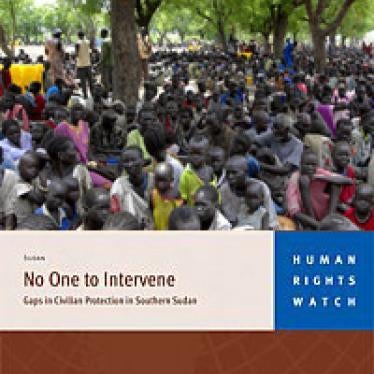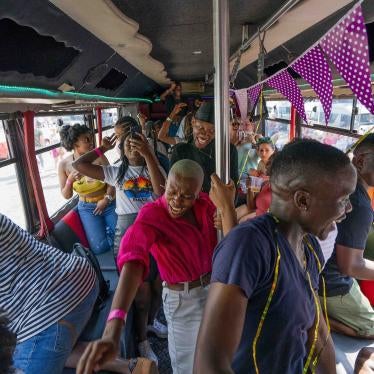(Juba, Sudan) - The government of Southern Sudan should increase the numbers of police and security forces in volatile areas of Jonglei state, where brutal inter-ethnic violence killed at least 185 civilians last week, Human Rights Watch said today. The southern government should thoroughly investigate the violence and prosecute those responsible. The United Nations peacekeeping mission should support these efforts and take preventive action to protect civilians.
In the latest in a series of violent incidents between the Lou Nuer and Murle ethnic groups, armed Murle youth attacked a group of Lou Nuer civilians on August 2, 2009, killing at least 185 men, women, and children, and seriously wounding scores more. Witnesses told UN peacekeepers and Jonglei state authorities who visited the site on August 5 that the attackers used automatic rifles, knives, and spears. Most of the victims were women and children, their bodies buried in shallow graves on the banks of the Geni river.
"Last week's attack is the latest in a deadly cycle of violence that has already taken more than 1,000 lives this year," said Georgette Gagnon, Africa director at Human Rights Watch. "The Southern Sudanese government and the United Nations need to step up their efforts to protect civilians."
Too few Sudanese security forces are in the area to effectively protect civilians. An estimated 90 police officers cover all of Akobo county, an area the size of Switzerland and Austria combined - more than 122,000 square kilometers - most of it inaccessible by road. Although approximately two dozen soldiers and a handful of police had accompanied the civilians, reportedly to protect them in the hostile terrain and fish with them, the security forces lacked equipment to call for back-up and helicopters to provide reinforcements. The hundreds of armed Murle attackers quickly overran the group. More than 10 soldiers were also killed in the attack. The attack was at a remote spot along the Geni river, at a contentious border area between Lou Nuer and Murle lands. The group of several hundred Lou Nuer had been living and fishing in the area for several weeks, driven there by hunger. They had walked from Akobo, where they were living after being displaced from smaller villages by intense fighting between Lou Nuer and Murle armed youth in March and April that killed an estimated 1,000 civilians. Their food supply was interrupted in June, when a separate conflict between two Nuer groups in Upper Nile state spurred attacks on boats transporting urgently needed food supplies down the Sobat river to Akobo.
"Right now, attackers know they won't be brought to justice," Gagnon said. "The government should immediately deploy properly resourced and enough security forces to contentious areas, not only in Jonglei state, but wherever civilians are vulnerable. The police should also start building a culture of accountability, working with local authorities to investigate and punish crimes."
The attack also underscores an urgent need to improve peace-building efforts by the Southern Sudan government and state authorities to prevent more revenge attacks following the March and April violence. The efforts included a series of visits by a government committee to the two communities and plans for a reconciliation conference, which has yet to take place. The UN mission has supported those efforts, but they have not been sufficient to prevent further violence.
"To protect civilians, the southern government needs to engage over a sustained period with state and local authorities from the communities involved, and with youth leaders in the cattle camps who carry out the attacks, to address the root causes of the conflict," Gagnon said. "They also need to track warning signs of revenge attacks, and deploy security forces accordingly."
UN peacekeepers were not in the area that was attacked. They had set up temporary bases in Akobo and Pibor in May, following the March and April violence. But they withdrew all forces and civilian staff from both towns in late July, with the onset of the rainy season. It is not clear whether the UN peacekeepers would have prevented the attack if they had remained, though. The attack site, 40 km southeast of Akobo, is not accessible by road, and the UN forces had not patrolled that far outside the town.
Following the attack, UN peacekeepers stepped up flights to Akobo and the attack site, transporting UN staff, and Southern Sudan and state authorities to assess the situation. While these steps were helpful, Human Rights Watch urged the peacekeepers to take additional steps to protect civilians.
"UN peacekeepers need to consider all the options to protect people in remote and hostile terrain, including foot patrols and frequent over-flights," said Gagnon. "They should work closely with the state and local authorities to develop strategies for effectively protecting civilians from more attacks."
Human Rights Watch also urged UN human rights officers to conduct a thorough and public investigation into the attacks and the government's response, and to work with the local authorities to promote accountability for all crimes committed.







